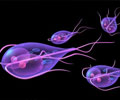At least 40 people have died of diarrhoea and cholera in the past two months and hundreds more are down with the diseases that have assumed alarming proportions in several parts of Assam.
At least 40 people have died of diarrhoea and cholera in the past two months and hundreds more are down with the diseases that have assumed alarming proportions in several parts of Assam.
A health department official said the worst hit were parts of Jorhat, Golaghat, Sivasagar and Nagaon -- most of the cases were reported from tea garden areas. The latest casualties have come in from the Borasali tea plantation near Sonari in Sivasagar district."Nine plantation workers have died in the last three days of diarrhoea, while more than 100 more are battling for their lives in hospitals," T. Tanti, a garden workers' union leader, told IANS over the phone.
In some areas, laboratory tests on patients suffering from diarrhoea found a strain of cholera. Authorities, however, said the strain was not 'very virulent' and there was no need to panic.
"The disease is spreading mostly in tea gardens and it is primarily due to lack of basic hygiene, non-availability of clean drinking water, and poor sanitation facilities. The garden managements should provide these amenities to their workers," a senior health department official said.
The Assam health department has sounded a general alert and launched a massive cleanliness drive, including distribution of water purifying tablets in the affected areas.
"All precautionary measures were being taken and the patients provided with the best of medical care," the official said. "We appeal to anyone down with symptoms of diarrhoea to come to the nearest hospital immediately," he added.
Advertisement
The source of the contamination is typically other cholera patients when their untreated diarrhoea discharge is allowed to get into waterways or into groundwater or the drinking water supply. Any infected water and any foods washed in the water, and fish living in the affected waterway can cause an infection.
Advertisement
LIN/V










